Top10 Virtualization Software Companies
Today, most often they write about containers, but server virtualization software continues to dominate in data centers. Here are the “top ten” vendors offering the best virtualization software solutions at the moment.
Any discussions on server virtualization often end in high tones, turn into an uncompromising dispute, but they begin almost always with VMware, so we will start our list of vendors of the best virtualization products for VPS with this company.

As for the offerings of server virtualization software technologies themselves, it is unlikely that you will need a deep knowledge of programming in order to profitably use all their components and sets of functions when the need arises. These solutions scale from a few virtual machines (VMs) for hosting a small number of websites, virtual desktops or intranet services to tens of thousands of VMs serving millions of Internet users. If the names of the products from this list do not tell you anything yet, then it's time to get to know them.
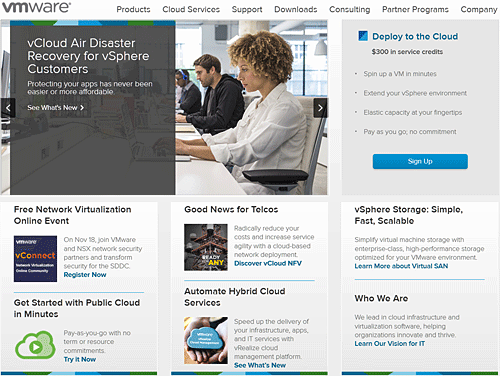
Try to find somewhere a data center that does not use VMware software. It is unlikely that you will be able to do this - there are very few such data centers. VMware dominates the server virtualization market, and this does not only apply to its commercial product VMware vSphere. VMware is also a leader in the desktop virtualization software (VDI) market, and possibly in the free server virtualization segment with its VMware Server product. VMware maintains leadership through innovation, strategic partnerships and highly reliable software products.
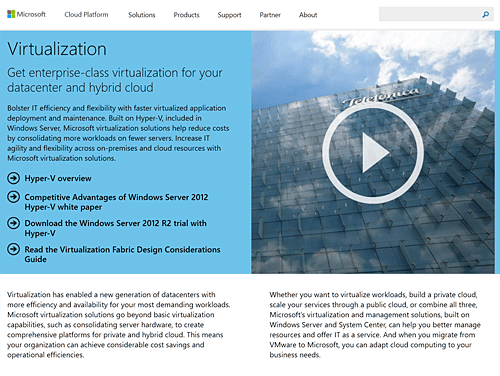
Microsoft entered the market with the only Hyper-V product other than Linux hypervisors in order to compete successfully in the server virtualization segment, where VMware had already dominated by then. Firmly rooted in the field of data centers, Microsoft currently offers an attractive Hyper-V licensing scheme and operating systems for it. For all Microsoft users, Hyper-V is a worthy solution that strengthens its competitive position with every release of the new release of Windows Server. Microsoft is also gaining more and more attention among companies that would like to use its Azure cloud services, and organizations interested in the integrated management of Hyper-V services on their VPS hosting site. and Azure services.

Citrix, once the lone wolf in the application virtualization segment, is today the vendor of the world's most widely used Xen cloud software (this is the basis of its commercial XenServer product). Amazon uses Xen in its Elastic Compute Cloud (EC2) services, the same can be said about the cloud offerings of Rackspace, Carpathia, SoftLayer, etc. As for corporate customers, here are illustrative examples - Bechtel, SAP and TESCO.

Over the past 15 years, Red Hat has been recognized as the industry leader and Open Source community. Estimated today as the most successful Open Source company, Red Hat entered the world in 2008 when it acquired Qumranet, and with it a virtualization solution: KVM and SPICE (Simple Protocol for Independent Computing Environment). In December 2009, Red Hat released SPICE as an open source protocol. Its renowned Red Hat Enterprise Virtualization (RHEV) server and workstation virtualization platform (now Red Hat Virtualization (RHV)) is based on the KVM hypervisor and the Red Hat Enterprise Linux server operating system (RHEL). RHEV is based on open standards and works with Linux and Windows, and also supports enterprise applications such as SAP, SAS and Oracle.
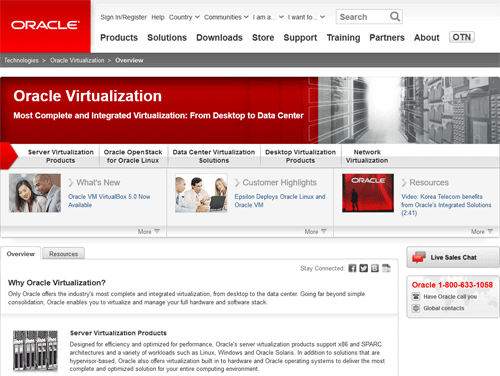
If you are not impressed by Oracle’s dominance in the enterprise-class database server segment, then the acquisition of Sun Microsystems has definitely made it a strong player in the virtualization market. In addition, Oracle owns its own OS (Sun Solaris), many virtualization software solutions (Solaris Zones, LDoms and xVM) and server platforms (SPARC). What happens if you apply force majeure (Oracle) to a fixed object (data center)? You will receive an Oracle-based data center.
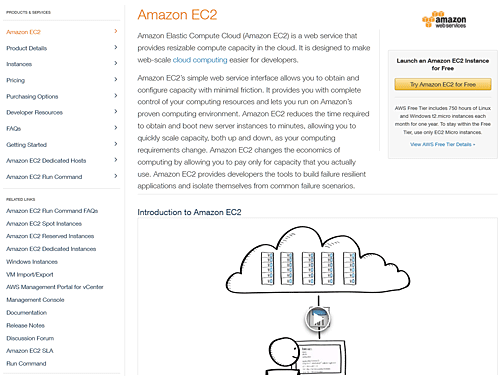
Amazon Elastic Compute Cloud (EC2) is an industry-standard virtualization platform. Ubuntu Cloud Server supports seamless integration with Amazon EC2 services. EngineYard Ruby application services also use the Amazon cloud.
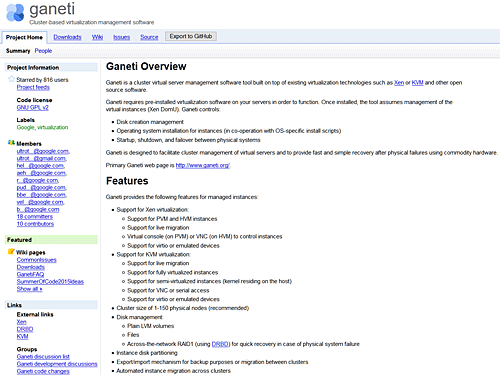
With Google, virtualization is clearly not the first thing that comes to mind, but Google Apps, AppEngine, and an extensive set of business services clearly demonstrate how the company has mastered cloud-centric services.
Its open-source Google Ganeti virtual server cluster management software is implemented “on top” of existing virtualization technologies like Xen or KVM and essentially acts as a shell for these hypervisors, helping system administrators create clustered configurations.
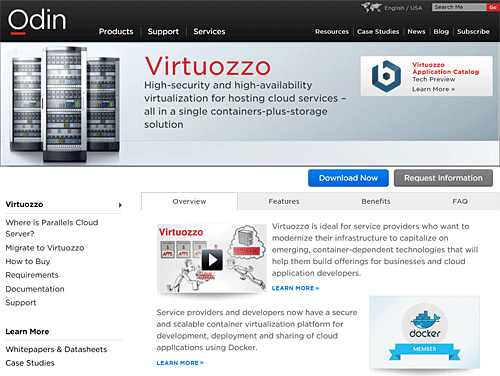
Parallels uses its Open Source OpenVZ project in a commercial product for hosting virtual servers under Linux (Virtual Private Server, VPS). High VM density and low cost are the main things you will hear when you become familiar with the hosting solution based on Parallels software. The world's largest hosting companies choose Parallels for precisely these two main reasons. But progress in containerized virtualization of Linux hosting based on Linux does not stand still. To maximize the number of Windows hosts per piece of hardware, Parallels has also developed container virtualization tools for Windows. Although Parallels is still best known for its desktop and application virtualization offerings, including Parallels Desktop and Server for Mac, its provider business was rebranded and in March 2015 it was renamed Odin, and Parallels Cloud Server software was called Virtuozzo. Virtuozzo allows you to run applications in separate lightweight containers, and Odin worked closely with container standards on Docker and Google.
In December 2015, the Odin brand and Odin Service Automation lines were sold to Ingram and transferred to its management together with 500 employees who are developing the Odin Service Automation platform. The directions of Plesk and Virtuozzo were separated into separate companies, Parallels Holdings Limited remained their main owner. Virtuozzo as part of the Parallels holding is now engaged in virtualization solutions.
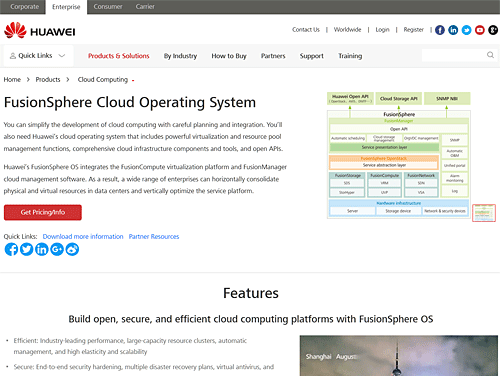
Huawei is one of the new players in the virtualization market; its corporate business was launched in 2011. Although the company is not well known in the US, Huawei has a significant share in telecom and in emerging markets in countries such as China, Brazil, Russia and India. Its FusionSphere virtualization infrastructure software, the main product of Huawei's virtualization and cloud infrastructure stack, is based on Xen. Like many other leading virtualization providers, Huawei uses OpenStack in its FusionSphere and FusionCloud solutions.
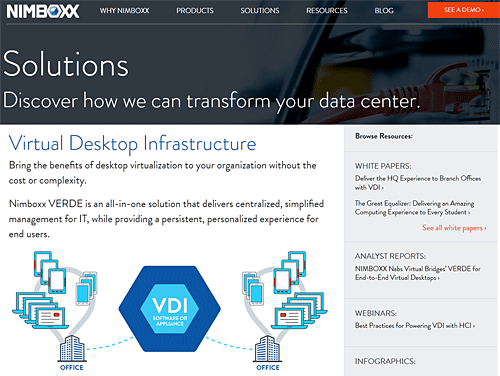
Virtual Bridges is the company that invented what is now called the Virtual Desktop Infrastructure (VDI). The Virtual Bridges VERDE product allowed users to deploy Windows and Linux desktops to any 32-bit or 64-bit Linux server infrastructure on a kernel version 2.6 or later (more about this in the VERDE corporate documents ). In February 2015, NIMBOXX acquired VERDE VDI from Virtual Bridges. NIMBOXX currently uses VERDE VDI technology as a ready-to-deploy VDI load solution and in a broader offering, delivering software-defined “data center in a box” to companies with any number of employees.
It was a modified translation of the article .
Thanks for attention!
Any discussions on server virtualization often end in high tones, turn into an uncompromising dispute, but they begin almost always with VMware, so we will start our list of vendors of the best virtualization products for VPS with this company.

As for the offerings of server virtualization software technologies themselves, it is unlikely that you will need a deep knowledge of programming in order to profitably use all their components and sets of functions when the need arises. These solutions scale from a few virtual machines (VMs) for hosting a small number of websites, virtual desktops or intranet services to tens of thousands of VMs serving millions of Internet users. If the names of the products from this list do not tell you anything yet, then it's time to get to know them.

1. VMware
Try to find somewhere a data center that does not use VMware software. It is unlikely that you will be able to do this - there are very few such data centers. VMware dominates the server virtualization market, and this does not only apply to its commercial product VMware vSphere. VMware is also a leader in the desktop virtualization software (VDI) market, and possibly in the free server virtualization segment with its VMware Server product. VMware maintains leadership through innovation, strategic partnerships and highly reliable software products.

2. Microsoft
Microsoft entered the market with the only Hyper-V product other than Linux hypervisors in order to compete successfully in the server virtualization segment, where VMware had already dominated by then. Firmly rooted in the field of data centers, Microsoft currently offers an attractive Hyper-V licensing scheme and operating systems for it. For all Microsoft users, Hyper-V is a worthy solution that strengthens its competitive position with every release of the new release of Windows Server. Microsoft is also gaining more and more attention among companies that would like to use its Azure cloud services, and organizations interested in the integrated management of Hyper-V services on their VPS hosting site. and Azure services.

3. Citrix
Citrix, once the lone wolf in the application virtualization segment, is today the vendor of the world's most widely used Xen cloud software (this is the basis of its commercial XenServer product). Amazon uses Xen in its Elastic Compute Cloud (EC2) services, the same can be said about the cloud offerings of Rackspace, Carpathia, SoftLayer, etc. As for corporate customers, here are illustrative examples - Bechtel, SAP and TESCO.

4. Red Hat
Over the past 15 years, Red Hat has been recognized as the industry leader and Open Source community. Estimated today as the most successful Open Source company, Red Hat entered the world in 2008 when it acquired Qumranet, and with it a virtualization solution: KVM and SPICE (Simple Protocol for Independent Computing Environment). In December 2009, Red Hat released SPICE as an open source protocol. Its renowned Red Hat Enterprise Virtualization (RHEV) server and workstation virtualization platform (now Red Hat Virtualization (RHV)) is based on the KVM hypervisor and the Red Hat Enterprise Linux server operating system (RHEL). RHEV is based on open standards and works with Linux and Windows, and also supports enterprise applications such as SAP, SAS and Oracle.

5. Oracle
If you are not impressed by Oracle’s dominance in the enterprise-class database server segment, then the acquisition of Sun Microsystems has definitely made it a strong player in the virtualization market. In addition, Oracle owns its own OS (Sun Solaris), many virtualization software solutions (Solaris Zones, LDoms and xVM) and server platforms (SPARC). What happens if you apply force majeure (Oracle) to a fixed object (data center)? You will receive an Oracle-based data center.

6. Amazon
Amazon Elastic Compute Cloud (EC2) is an industry-standard virtualization platform. Ubuntu Cloud Server supports seamless integration with Amazon EC2 services. EngineYard Ruby application services also use the Amazon cloud.

7. Google
With Google, virtualization is clearly not the first thing that comes to mind, but Google Apps, AppEngine, and an extensive set of business services clearly demonstrate how the company has mastered cloud-centric services.
Its open-source Google Ganeti virtual server cluster management software is implemented “on top” of existing virtualization technologies like Xen or KVM and essentially acts as a shell for these hypervisors, helping system administrators create clustered configurations.

8. Parallels / Virtuozzo
Parallels uses its Open Source OpenVZ project in a commercial product for hosting virtual servers under Linux (Virtual Private Server, VPS). High VM density and low cost are the main things you will hear when you become familiar with the hosting solution based on Parallels software. The world's largest hosting companies choose Parallels for precisely these two main reasons. But progress in containerized virtualization of Linux hosting based on Linux does not stand still. To maximize the number of Windows hosts per piece of hardware, Parallels has also developed container virtualization tools for Windows. Although Parallels is still best known for its desktop and application virtualization offerings, including Parallels Desktop and Server for Mac, its provider business was rebranded and in March 2015 it was renamed Odin, and Parallels Cloud Server software was called Virtuozzo. Virtuozzo allows you to run applications in separate lightweight containers, and Odin worked closely with container standards on Docker and Google.
In December 2015, the Odin brand and Odin Service Automation lines were sold to Ingram and transferred to its management together with 500 employees who are developing the Odin Service Automation platform. The directions of Plesk and Virtuozzo were separated into separate companies, Parallels Holdings Limited remained their main owner. Virtuozzo as part of the Parallels holding is now engaged in virtualization solutions.

9. Huawei
Huawei is one of the new players in the virtualization market; its corporate business was launched in 2011. Although the company is not well known in the US, Huawei has a significant share in telecom and in emerging markets in countries such as China, Brazil, Russia and India. Its FusionSphere virtualization infrastructure software, the main product of Huawei's virtualization and cloud infrastructure stack, is based on Xen. Like many other leading virtualization providers, Huawei uses OpenStack in its FusionSphere and FusionCloud solutions.

10. VERDE VDI
Virtual Bridges is the company that invented what is now called the Virtual Desktop Infrastructure (VDI). The Virtual Bridges VERDE product allowed users to deploy Windows and Linux desktops to any 32-bit or 64-bit Linux server infrastructure on a kernel version 2.6 or later (more about this in the VERDE corporate documents ). In February 2015, NIMBOXX acquired VERDE VDI from Virtual Bridges. NIMBOXX currently uses VERDE VDI technology as a ready-to-deploy VDI load solution and in a broader offering, delivering software-defined “data center in a box” to companies with any number of employees.
Virtualization Product Comparison
| Vendor | License | VM per host | Customers | Virtualization type | Management tools |
| VMware vSphere Enterprise Edition | proprietary | 1025 | corporate segment | ⬝ full virtualization ⬝ hardware- assisted virtualization ⬝ paravirtualization | ⬝ capacity planning // management ⬝ change reports ⬝ dynamic resource allocation ⬝ live migration ⬝ P2V conversion ⬝ performance metrics производительности performance reports ⬝ power management ⬝ real-time notification ⬝ shared resource pools ⬝ thin provisioning (Thin Provisioning ) ⬝ VM backup / restore ⬝ VM migration |
| VMware vSphere Standard Edition | proprietary | 512 | corporate segment | ⬝ full virtualization ⬝ hardware- assisted virtualization ⬝ paravirtualization | ⬝ power planning / management ⬝ backup / restore VM |
| VMware vSphere ESXi Hypervisor | proprietary | 120 | small and medium businesses | ⬝ full virtualization ⬝ hardware- assisted virtualization ⬝ paravirtualization | ⬝ configuration mapping ⬝ dynamic resource allocation ⬝ fail-safe configuration (Failover) ⬝ live migration ⬝ thin provisioning (Thin Provisioning) ⬝ virtual firewall |
| Microsoft Hyper-V Server 2008 R2 SP1 | proprietary | 318 | small and medium businesses | ⬝ full virtualization ⬝ hardware- assisted virtualization ОС OS virtualization | ⬝ capacity planning / management ⬝ change reports ⬝ configuration snapshots ресурсов dynamic resource allocation ⬝ high availability ⬝ live migration ⬝ performance reports ⬝ shared resource pools Storage storage migration ⬝ VM migration |
| Microsoft Windows Virtual PC | proprietary | SMB | ⬝ full virtualization ⬝ hardware-assisted virtualization | ⬝ change reports | |
| Citrix XenServer | proprietary | 75 | ⬝ personal ⬝ SMB ⬝ corporate | ⬝ virtualization with hardware support ⬝ paravirtualization | ⬝ Resource Management ⬝ Capacity Planning / Management ⬝ Configuration Snapshots High High Availability ⬝ Live Migration производительности Performance Reports ⬝ Power Management igration Storage Migration ⬝ Thin Capacity Distribution ( Thin Provisioning) ⬝ virtual firewall ⬝ VM migration |
| Citrix XenServer Free Edition | Open Source (free) | 1000 | ⬝ personal ⬝ SMB | ⬝ virtualization with hardware support ⬝ paravirtualization | ⬝ resource management ⬝ configuration mapping ⬝ configuration snapshots Live live migration ⬝ performance reports емкости thin capacity distribution Th virtual firewall |
| Red Hat Virtualization 4.0 | Open source | 160 | corporate segment | ⬝ full virtualization ⬝ hardware- assisted virtualization ⬝ paravirtualization | ⬝ resource management ⬝ “snapshots” of the configuration ⬝ live migration ⬝ performance metrics ⬝ frontier migration ⬝ VM migration SP SPICE protocol for delivering virtual desktops (VDI) |
| Oracle Solaris Containers | proprietary | SMB | OS virtualization | ⬝ “snapshots” of co-configuration ⬝ live VM migration ⬝ P2V conversion | |
| Oracle VM Server for SPARC | proprietary | 128 | corporate segment | ⬝ full virtualization ⬝ OS virtualization | ⬝ task automation ⬝ capacity planning / management ⬝ configuration snapshots ресурсов dynamic resource allocation ⬝ fail-safe configurations F live migration нескольких multiple host resource pools ⬝ power management ⬝ real-time notifications общих shared resource pools storage migration ⬝ VM migration |
| Oracle VM Server for x86 5.0 | Open Source (free) | 128 | corporate segment | ⬝ virtualization with hardware support ⬝ paravirtualization | ⬝ task automation ⬝ power planning / management ресурсов dynamic resource allocation ⬝ fail-safe configurations (Failover, High Availability) ⬝ live migration Maintenance Maintenance mode ⬝ P2V conversion ⬝ power management общих shared resource pools ⬝ storage migration ⬝ thin capacity allocation (Thin Provisioning) ⬝ VM cloning ⬝ VM migration |
| Oracle VirtualBox 4.5 | proprietary | 128 | SMB, corporate segment | ⬝ virtualization with hardware support ⬝ paravirtualization | ⬝ resource management ⬝ task automation ⬝ configuration mapping fail-safe configurations (Failover, High Availability) ⬝ live migration ⬝ resource pools of multiple hosts ⬝ P2V conversion ⬝ shared resource pools ⬝ VM cloning |
| Amazon (Xen data) | Open source | 500 | SMB, corporate segment | ⬝ virtualization with hardware support ⬝ paravirtualization | ⬝ resource management ⬝ “snapshots” of configuration ⬝ high availability ⬝ live migration ⬝ maintenance mode производительности performance metrics хранили storage migration ⬝ VM cloning рация VM migration |
| Google Geneti (KVM data; see also Xen) | Open source | personal, SMB | ⬝ full virtualization ⬝ hardware- assisted virtualization ⬝ paravirtualization | ⬝ resource management ⬝ “snapshots” of the configuration ⬝ live migration ⬝ performance metrics ни frontier migration ⬝ VM migration | |
| Parallels Server Bare Metal | proprietary | SMB, corporate segment | ⬝ full virtualization ⬝ hardware- assisted virtualization ОС OS-level virtualization | ⬝ task automation ⬝ live migration ⬝ storage migration ⬝ VM migration | |
| Virtuozzo | proprietary | SMB | ⬝ virtualization with hardware support ⬝ OS-level virtualization | ⬝ dynamic allocation of resources ⬝ high availability ⬝ live migration хранили storage migration | |
| Huawei FusionSphere OpenStack / FusionCloud (based on Xen / OpenStack) | Open source | SMB, corporate segment | ⬝ virtualization with hardware support ⬝ paravirtualization | ⬝ resource management ⬝ “snapshots” of configuration ⬝ high availability ⬝ live migration ⬝ maintenance mode производительности performance metrics хранили storage migration ⬝ VM cloning рация VM migration | |
| VERDE Virtual Bridges | proprietary | corporate segment | ⬝ full virtualization ⬝ hardware- assisted virtualization ⬝ paravirtualization | ⬝ integrated backup ⬝ resource pools ⬝ task automation ⬝ VM templates ⬝ high availability (VM restart) |
It was a modified translation of the article .
Thanks for attention!
